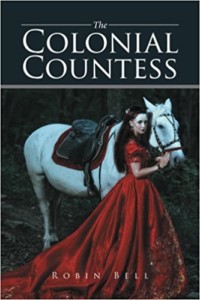Title: The Colonial Countess
Author: Robin Bell
Publisher: XlibrisAU
ISBN: 9781524522568
Pages: 130
Genre: Fiction
Reviewed by: Joe Kilgore
Pacific Book Review
Robin Bell has penned something out of the ordinary in The Colonial Countess. It is a historical novel whose heroine exhibits all the attributes of a modern day, independent young woman. Rather than seeming odd, or out of place, it’s a juxtaposition that makes you feel as if you’re reading a Jane Austin novel with a early Oprah Winfrey as the protagonist—Strangely enough, it works very well.
Mary is a nineteen-year-old farm girl in 1885 Australia who is in for a slew of surprises. First she learns her mother is more than she seems. Not just another Aussie housewife, her mom is actually the daughter of an English Countess. Mom however dies and it falls to Mary to return to England to claim her inheritance and her rightful place in society. Once in Great Britain, she soon realizes that she, herself, is heir to the family fortune, multiple lands, businesses, homes, and estates, as well as the title of Countess.
The novel then explores Mary’s emergence as a Peer Of The Realm, where her honesty, lack of pretense, and genuine affection for other human beings, creates quite a stir among the tradition-laden populace in the English countryside. She soon befriends, rather than berates, her estate workers. She takes an active, rather than passive, role in overseeing the overall operations of her multiple holdings. In so doing she unearths a dastardly plan by her predecessor’s Estate Manager to line his own pockets while simultaneously bankrupting the many hard-working common folks who live, work, and attempt to prosper on the Countess’s lands. She holds to some social conventions while simultaneously turning others on their ear. She takes in orphan boys who have been mistreated in hellish workhouses. She saves two female street urchins from a life of depravity and despair. She wins the heart of mistreated dogs, wild horses, and initially skeptical village folks. Simply put, she seems to find a way to right a number of wrongs and make all in her sphere better off than before she arrived. But, can it all last?
Bell has chosen to tell her tale via a third-person prose. She writes vividly, cohesively, and keeps action and events moving swiftly along. One oddity however, is that her story is told virtually devoid of dialogue. A questionable decision that definitely aids pace but may do so at the expense of deeper emotional involvement. The story itself is engaging though, and the individual characters are delineated nicely. Young women will find much to admire and much to aspire to in this creation of a smart, strong, vibrant woman, unafraid to tackle what Thoreau referred to as the “deep ruts of tradition and conformity.” By the way, the novel’s ending gives one the distinct impression that there are additional stories to be told of The Colonial Countess.


